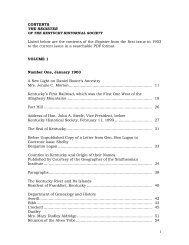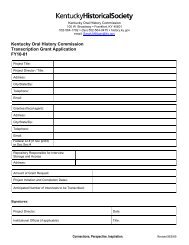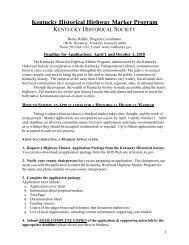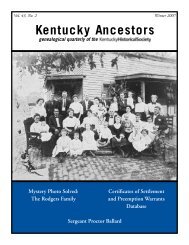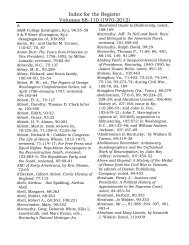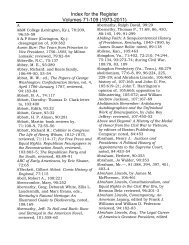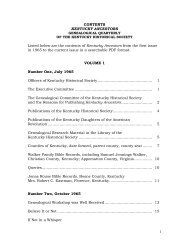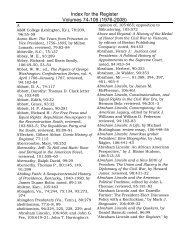Kentucky Ancestors, Volume 46, Number 2 - Kentucky Historical ...
Kentucky Ancestors, Volume 46, Number 2 - Kentucky Historical ...
Kentucky Ancestors, Volume 46, Number 2 - Kentucky Historical ...
You also want an ePaper? Increase the reach of your titles
YUMPU automatically turns print PDFs into web optimized ePapers that Google loves.
to the clerk of the county court as delinquent.” The<br />
county court certified to the state auditor the amount<br />
due the assessor for his services after the tax book<br />
was completed and returned. Assessors and their<br />
assistants had to swear in open court that all persons<br />
listing taxable property had “made oath to the truth<br />
of the schedule.” The assessor received ten cents for<br />
each list of taxable estate; payment for services was<br />
made by the state treasurer upon the warrant of the<br />
state auditor.<br />
All estate taxed according to its value was ordered<br />
to be valued in gold and silver, as of the tenth day<br />
of January preceding. “And the person owning or<br />
possessing the same on that day was directed to list<br />
the estate with the assessor and remain bound for the<br />
tax, notwithstanding he may have sold or parted with<br />
the same.”<br />
Merchants and grocers were ordered to list the<br />
goods and groceries on hand on the tenth day of<br />
April in each year. They stated, under oath, the full<br />
value thereof, exclusive of the articles manufactured<br />
by <strong>Kentucky</strong> families.<br />
Assessors, from their own knowledge and from<br />
the statements of the person listing the property for<br />
taxation, and such other evidence as they obtained<br />
upon oath of witnesses, fixed a full and fair value<br />
upon all the estate listed for taxation, which was to<br />
be taxed according to its value, then entered the same<br />
in the order and manner prescribed, in the tax book,<br />
giving the aggregate value.<br />
Pursuant to legislation approved 17 February<br />
1851, tax assessors were directed to record the names<br />
of “deaf and dumb children between the ages of seven<br />
and twenty-one years, inclusive” and the name of the<br />
post office nearest their residence on the back page<br />
(or cover) of tax assessment books.<br />
The tax assessor was required to list the names<br />
of tavern keepers and the owners or keepers of stud<br />
horses, jacks and bulls who had obtained a license in<br />
the assessment book returned to the auditor.<br />
In 1857 and every eighth year thereafter, the<br />
assessors’ book had to include a statement of the<br />
number of qualified voters residing in the county<br />
and, when a town or city within his county had<br />
separate representation in either house of the general<br />
assembly, the assessor had to report the number of<br />
qualified voters in the city or town.<br />
The assessor, at the time he returned his tax book,<br />
was also ordered to return the names of all delinquent<br />
78 | <strong>Kentucky</strong> <strong>Ancestors</strong><br />
and fraudulent taxpayers. The clerk was directed to<br />
issue a summons stating the offense in general terms,<br />
against each of the delinquents, returnable to the<br />
next term of the county court. The defendant had<br />
the right to have his case heard by a jury “composed<br />
of bystanders summoned by the sheriff.” If the<br />
defendant was found guilty, the court was ordered<br />
to enter the judgment for the fine, and triple tax and<br />
costs. The fine and tax was to be certified by the clerk<br />
to the state auditor and accounted for by the sheriff as<br />
other public moneys.<br />
The sheriff, by virtue of his office, collected tax<br />
revenue from and after the first of June each year.<br />
The sheriff accounted for and paid all taxes and other<br />
public moneys, for which he was bound, into the<br />
state treasury by 15 December each year. The sheriff<br />
also reported the names of insolvent and delinquent<br />
taxpayers then proceeded to sell properties to recover<br />
tax revenues. The sheriff was paid twenty-five cents<br />
for each list of taxable property that he reported and<br />
which the assessor failed to report.<br />
Each county judge appointed “three discreet<br />
taxpayers, citizens of the county” to serve on the<br />
board of supervisors to oversee tax collection. It<br />
was their duty to examine the tax books each year,<br />
to correct any errors of the assessor, and, in cases<br />
where they were of the opinion that the estate was<br />
incorrectly valued, to fix the same at its proper value.<br />
The county clerk, after examining and approving<br />
the tax books, was directed to make two copies<br />
thereof—one for the sheriff and the other for the<br />
state auditor. If the tax book for the year wasn’t<br />
returned by the assessor, the county clerk was ordered<br />
to copy and deliver to the sheriff the tax book of the<br />
previous year by the first day of June. The book was<br />
to be used for collection and payment of taxes due.<br />
The lands of nonresident proprietors were<br />
ordered to be listed with the auditor of public<br />
accounts for taxation purposes. “If not so entered,<br />
they shall be thereby forfeited, and the title vested in<br />
the Commonwealth.” Nonresidents who challenged<br />
the tax assessment could apply to the county court<br />
for a correction. Nonresident proprietors were to<br />
pay the taxes due on their lands on or before the<br />
tenth day of February in each year. If not paid,<br />
fifty percent was added to the amount for the first<br />
failure; for the second year, the tax was doubled; and<br />
if not paid for three consecutive years, the tax was<br />
to be increased one hundred percent for the third





